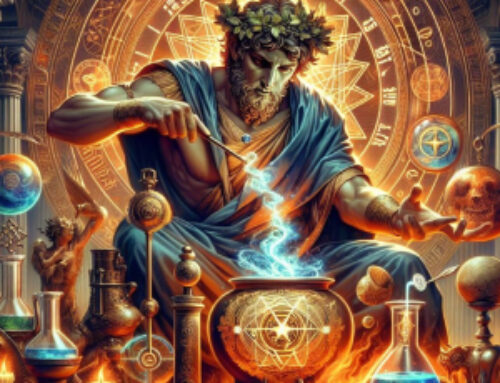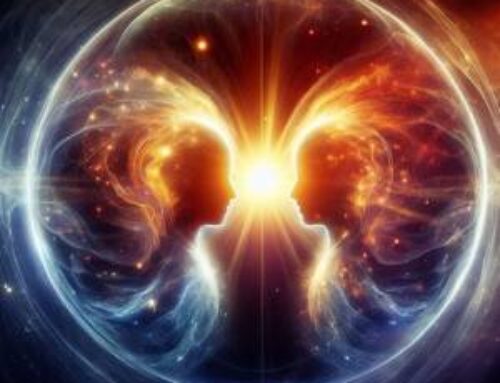Contents
In the mystical pursuit of alchemy, practitioners embark on a transformative journey not only of substances, but of the soul itself. Shrouded in symbolism and steeped in esoteric wisdom, this ancient art has evolved through the ages to offer pathways to spiritual enlightenment and the transmutation of the mundane into the divine. Alchemy is the highest form of spiritual education because it uniquely combines physical and spiritual transformation, revealing the necessary changes that occur within the human body for permanent enlightenment and the awakening of higher senses, which is not possible with an ordinary physical body alone.

Historical Roots and Philosophical Foundations
The roots of alchemy reach deep into history, touching ancient civilizations such as Egypt, China, and the Islamic world. It arose as a confluence of practical chemistry, mysticism, and spirituality, with the goal of finding the philosopher’s stone capable of turning base metals into gold and granting eternal life. At its core, however, alchemy is a spiritual practice that uses metaphors of chemical transformation to describe the inner work necessary for personal enlightenment.
Common Misconceptions about Alchemy
While the idea of turning lead into gold is often associated with alchemy, this is not the primary focus of the tradition. Alchemy is more concerned with spiritual transformation and personal growth than with material wealth.
Alchemy is often misunderstood as a pseudoscience that lacks empirical evidence or scientific rigor. However, many alchemists were and are accomplished scientists and philosophers who have made significant contributions to fields such as chemistry, medicine, and psychology.
Alchemy is often confused with witchcraft or sorcery, but it is actually a spiritual and philosophical tradition that seeks to understand and transform the self. While some alchemical texts may include symbols and imagery, the core of alchemy is concerned with spiritual growth and self-realization.
Alchemy may not be as widely practiced today as it was in the past, but it is still a living tradition with many modern practitioners and interpreters. All authentic spiritual paths use the tools of alchemy to transmute their subtle and physical bodies in order to experience enlightened consciousness.
Alchemy is often seen as being in conflict with modern science, but many alchemical concepts and practices have been incorporated into modern scientific fields such as chemistry, physics, and psychology. Alchemy and science can be seen as complementary rather than conflicting ways of understanding the world. Alchemy is the art of transformation and a necessary part of human evolution. While personal transformation is a key aspect of alchemy, it is not the only aspect. Alchemy also seeks to understand and transform the world around us and within us.
Alchemy has spiritual and philosophical aspects, but it is not a religion. Alchemy can be practiced alongside any religion or spiritual tradition, and its principles and practices can be adapted to a wide range of belief systems. Alchemy is not limited to any particular social class or group, and its teachings can be applied to anyone seeking spiritual growth and self-realization.
While the Philosopher’s Stone is a central concept in alchemy, it is not the only aspect of the tradition. But the Philosopher’s Stone is a key element in alchemical development and a result of the completion of the Great Work or Opus Magnum.
The alchemist does not need a traditional chemical laboratory, as his own life becomes the laboratory and his own body serves as the Athanor, with all vessels and instruments symbolically and personally represented, and the gold symbolizing a spiritual transformation within the alchemist himself.
Hidden Principles of Alchemy
Alchemy is a complex and multifaceted tradition, and its principles and practices can vary greatly depending on context and interpretation. Alchemy is based on the idea that everything in the universe is interconnected and unified. This principle is often expressed through the concept of macrocosm and microcosm, which suggests that the same patterns and principles that govern the universe also govern the individual.
Alchemy is concerned with the transformation of matter, both physical and spiritual. This transformation is often symbolized by the process of turning lead into gold, which represents the transformation of base materials into something more valuable and refined.
In alchemy, each of the seven metals (lead, tin, iron, copper, mercury, silver, and gold) is associated with a specific planet and set of qualities, and the transformation of these metals is seen as a key aspect of the alchemical process. These metals correspond to the seven chakras or energetic centers of the human being.
Alchemy recognizes the importance of the four elements – earth, air, fire and water – in the transformation of matter. Each element is associated with specific qualities and properties, and by understanding and manipulating these elements, alchemists can transform matter and achieve spiritual growth.
Prima Materia is a central concept in alchemy, representing the original or primal matter from which all things are made. Prima materia is often associated with the idea of the “one thing” or “universal substance” that underlies all matter.
The alchemist plays a central role in the alchemical process, serving as both observer and participant. The alchemist must engage in a process of self-transformation, using alchemical practices and principles to refine and purify the self.
In alchemy, sulphur (self-consciousness), mercury (superconsciousness) and salt (subconsciousness) are known as the three principles or tria prima. These three substances are believed to be the basic building blocks of all matter and are often associated with the three alchemical processes of separation, purification, and recombination. Together, these three principles represent the fundamental qualities of all matter and are used in alchemical processes to transform and refine substances.
Alchemy makes extensive use of symbols and imagery to convey its teachings and principles. These symbols often have multiple layers of meaning, representing both physical and spiritual concepts.
The Process of Transformation
The Great Work, or Magnum Opus, symbolizes the alchemist’s quest in three stages: nigredo (blackening), albedo (whitening), and rubedo (reddening). These stages represent a process of purification, enlightenment, and unification of opposites, mirroring the soul’s journey toward its divine essence. The Great Work is an important step in the alchemical process that involves the transformation of the self and the world, leading to a state of enlightenment and unity with the universe.
One of the most insightful modern books on alchemy, “Alchemy: Secrets of Consciousness Transformation” by Dr. Elias Rubenstein, provides a comprehensive and accessible exploration of the principles and practices of alchemy, illuminating its relevance to modern spirituality and personal growth. The tools and practices of alchemy provide a framework for authentic spiritual development, allowing one to assess and verify one’s progress and ensuring that any claims of spiritual enlightenment are based on genuine and verifiable transformation.
Symbols and Allegories
Alchemy communicates its secrets through a rich tapestry of symbols-dragons, phoenixes, and the Ouroboros, a snake that eats its own tail, representing the cyclical nature of life and the unity of opposites. These allegories encode the principles of transformation and guide the seeker through the mysteries of creation and the principles that govern the cosmos.
Legacy and Modern Relevance
At its core, alchemy offers a path to understanding the material and spiritual worlds and advocates a harmonious balance between the two. It teaches that through the process of transformation, one can achieve a state of higher consciousness that unlocks the secrets of nature and the soul.
If you’re interested in learning more about alchemy and its relevance to modern spirituality and personal growth, consider exploring the teachings of the Hermetic Academy, an authentic mystery school. With a rich tradition of esoteric knowledge and a commitment to the study and practice of alchemy, the Hermetic Academy offers a unique opportunity to deepen your understanding of this ancient tradition and its potential to transform your life.
By studying with experienced teachers and a community of like-minded seekers, you can gain a deeper appreciation for the principles and practices of alchemy and how they can be applied to your own spiritual journey. Join the community of seekers and explorers at the Hermetic Academy and discover the power of alchemy for yourself.





